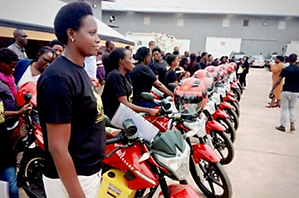Living Labs
The key motivation for the Urban Living Lab Center and Hubs is the vision to combine capacity building and local implementation support for the transition towards sustainable cities. Thematic areas include socio-economic, legal, financial, political and institutional feasibility of integrated urban transition strategies. This aims to link academic studies and the collaboration with local authorities and other relevant stakeholders on concrete implementation actions. The ambition in this respect is to enable and support the implementation of tangible implementation actions in cities internationally.
Find out more about our Demo Cities

Hamburg
-
4 physical e-scooter parking zones have been implemented.
-
T-Systems initiated and coordinated the electrification of the taxi fleet together with the city of Hamburg.
-
The living lab Hamburg was accompanied by the integration of a Low Carbon Mobility Monitoring (LCMM) tool to measure the fuel or electricity consumption and emissions of taxis.

Madrid
-
Completion of the infrastructure works for the installation of the ABB charging solution Carabanchel bus depot.
-
Development of software solutions towards support of multiple pantographs by an advanced multi-outlet bus charging solution
-
Testing a mobile inverted pantograph provided by ABB.
-
Managing the new mobility hub with charging solutions for diverse services at Fuente de la Mora P&R facility.

Quito
-
Multimodal e-mobility hub in the Historic Center of Quito with 10 e-cargo bikes, locally manufactured, deployed at the area to transport supplies, goods, light parcels and recycled materials (two months)
-
4 operating schemes and 7 participants including a local fruit and vegetable vendor, restaurants, a bike messenger association, two courier companies and two waste picker’s associations.
-
Testing a Mobility as a Service Application (MaaS App) for Public Transport.

Montevideo
-
The SOLUTIONSplus delegation joined the Municipality and the Public Utility Company teams in the Ciudadela Terminal for a site visit that was followed by a working session.
-
The procurement process will be launched soon and the e-taxi chargers needed have been secured (2nd EU Innovators Call).
-
The urban logistics component was carried out with the support of the MOVÉS Project of the Ministry of Industry and Energy andthe Julio Ricaldoni Foundation (FJR). For the pilot, two e-cargo bikes, one of each manufacturer, were introduced in theoperations of PedidosYA, the Latin American subsidiary of Delivery Hero, for a period of two weeks.
Pasig
-
Shared use of smart, multi-purpose, locally-designed and produced e-quadricycles for passenger and cargo to support the City’s day-to-day operations.
-
Local manufacturer - Tojo Motors Corp. completed development of the prototype of the flexible electric vehicle.
-
With De La Salle University, an integrated platform that features a booking app, a fleet management interface, and a systems and components monitoring is currently being developed.
-
The shared system will also feature innovative Flexible Electric Vans (FLEV), that has been developed through funding from the Philippine Department of Science and Technology (DOST).
Hanoi
-
Procurement and arrangements for last mile connectivity for fifty units of e-mopeds (Vinfast Ludo).
-
A first trial from QiQ was conducted and IoT was installed for V-Share.
-
The pilot project for last-mile connectivity was launched in Hanoi to offer a connection between a BRT Station (Van Khe) and the AEON Mall in Ha Dong using electric two-wheelers. The shared e-mobility system consists of electric 2-wheelers (50 e-mopeds and 10 QIQ e-bikes).



Kathmandu
-
Sajha Yatayat has selected a supplier for the supply & delivery of a conversion kit for the conversion of a converting a diesel bus to an electric bus
-
Prototypes for remodelling of e-3 wheelers (Safa Tempo) for passenger and cargo use cases by local company – Clean Energy International (CEI), are ready and are on the test run.
-
Prototypes for a new design of e-3 wheelers with a multi-use concept and e-shuttle vans are complete.
-
SOLUTIONSplus launched the electric 3-wheelers in Kathmandu 11/2022 as the first phase.
Kigali
-
Two main components: 1) Electric bicycles 2) Gender-inclusive e-motos
-
The bikeshare system was launched in September 2021 with 80 conventional bicycles, to be completed by 50 e-bikes in mid-2023.
-
In July 2022, 80 bike racks were deployed at strategic locations.
-
In November 2022, 24 electric motorcycles were handed over to the women trained and having successfully passed the driving exam.

Dar es Salaam
-
Two main components: 1) Electric tuk-tuks for passenger services 2) Pedal-assist electric bicycles for urban deliveries and medical supplies
-
Unprecedented data was collected in 2021 and 2022 to electrify feeder tuk-tuks to the Bus Rapid Transit (BRT) network. Electric tuk-tuk prototypes locally developed (new and retrofitted) will be launched in the first quarter of 2023.
-
In November 2022, 16 pedal-assist electric bicycles co-designed with a German company were locally assembled and handed over to the cooperative.




